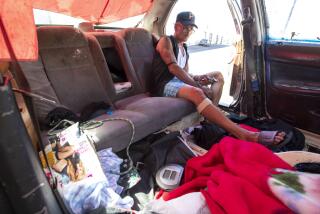Re-Education Camps Target Prostitution
- Share via
YEN BAI, Vietnam — The re-education camp for women with “social disorders” stands amid rice paddies and peasant farms at the end of a long dirt road, a lonely reminder of all the changes, good and bad, sweeping Vietnam.
During the American War, as it is called here, this cluster of yellow stucco buildings 70 miles northwest of Hanoi was run by the army and housed young criminals and draft dodgers.
Today, the camp is run by the provincial government’s Social Affairs Department and houses 93 women. Their “disorder”? They are all convicted prostitutes and have been sent here by the police, with court approval, for three to 12 months.
Vietnam’s Communist government sees in their cases a worrisome sign of moral decay as the discipline of a wartime society gives way to the temptations of a free-market, peacetime economy.
Prostitution and drug use are increasing today, as is the trafficking across the Cambodian and Chinese borders in Vietnamese women who are sold into prostitution. The government of this conservative society is trying to tackle the problem through decree and education.
In 1994, the national government set up the Social Evils Prevention Department. Since then, Hanoi has executed drug dealers and censored the Internet so computer users do not have access to pornography.
Vietnam has also stationed more guards on the borders to intercept traffickers in prostitutes--most of the estimated 18,000 prostitutes in Cambodia are Vietnamese--and arrested 3,000 people linked to prostitution. Billboards in Hanoi and Ho Chi Minh City, formerly Saigon, urge citizens to remain morally pure.
“I don’t think these problems are imported from the West, as some say,” said Le Hien, planning chief of the Social Evils Prevention Department. “They belong to all societies, but you’ve got to remember that during the time we were fighting for our independence, we, quite unlike the South, had no social evils. We were disciplined and entirely focused on the job at hand.”
Nguyen My Hanh, a husky-voiced 21-year-old who is spending time at the re-education camp here, moved to Hanoi five years ago after her father died. Unable to find a job, she turned to prostitution to support her heroin habit.
“It was a terrible life,” she said. “Some days I didn’t earn enough to buy food. But the heroin was easy to find, and before my husband went away to drug rehabilitation, we were using a lot of it. It’s a life I don’t want to go back to. I am treated well here, so I am not unhappy to be in Yen Bai.”
The phrase “re-education camp” conjures up distressing images of the crude facilities where 200,000 to 400,000 South Vietnamese were locked up for political indoctrination after the war. Some remained incarcerated for 17 years, being released only in 1992.
But the Yen Bai re-education camp represents the gentler face of Vietnam. The camp has no barbed wire and no locked gates. The residents do not wear uniforms or march in formation. They are here for rehabilitation, not punishment. They receive medical treatment--all 93 women have venereal disease; three are HIV-positive--in addition to counseling, moral education and job training as milliners, seamstresses and farmers.
“We think of this as a humanitarian program,” said camp director Nguyen Tiong Pham, 49, who previously worked with the elderly and the handicapped.
“I try and try and try to explain why prostitution is wrong and why these women should learn to contribute to society,” he said. “And if they don’t understand today, then I try again tomorrow.”
Most provinces have similar centers for prostitutes. This camp was set up in 1986, the same year Vietnam moved away from its state-run economy and adopted a program known as doi moi, leading to a free-market system.
The resultant changes have widened the gap between rich and poor, urban dweller and rural peasant. Additionally, huge numbers of country people have poured into the cities, looking for jobs but sometimes finding only more poverty or lives in prostitution.
Although similar changes have taken place in other developing nations, Vietnam’s situation is unusual because wars with France and the United States between 1950 and 1975 left the country with 1.4 million widows and a population consisting of far more women than men.
In rural Vietnam--where women who remain single and do not bear children are pitied and sometimes scorned--it is assumed that a woman not married by the age of 20 will be a spinster.
More to Read
Sign up for Essential California
The most important California stories and recommendations in your inbox every morning.
You may occasionally receive promotional content from the Los Angeles Times.













